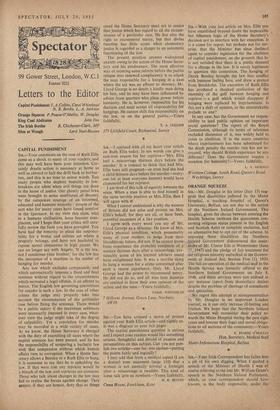W. DOUGLAS
Secretary KING COAL ABDICATES Although, short of economic collapse, it is plain that for some decades to come the demand for fuel and power must show an up- ward trend, the present impasse could have been avoided had • the, last Conservative Government pursued a vigorous fuel and power policy, and it is for this reason that Mr. Gerald Nabarro has rightly resigned his ' joint secretaryship of the Conservative Fuel and Power Committee. His knowledge of fuel and power matters is very considerable and his moral courage in taking this step is very greatly to be admired.
Although both the Minister of Fuel and Power and the National Coal Board deserve severe censure, nothing can be achieved by attacking either to help British industry to weather the very critical years which lie ahead in the immediate future. The plain fact of the matter is that the National Coal Board have not produced the goods for some time past, nor will they do so for some years to come. That the Minister must accept the responsibility for the present state of affairs is confirmed by the admission of assenting to the National Coal Board's import policy during Questions in the House of Commons on July 11. Industry must accept the present challenge, as suggested by the National Industrial Fuel Efficiency Service immediately after the recent announcement that the price of coal would be increased by 18 per cent. forthwith.
According to various statements made by Sir Leslie Hollinghurst, the chairman of NIFES, during recent months, industry is wast- ing at least 9,000,000 tons of coal per year, due to inefficient boiler-house arrangements and associated subjects. Something of the order of 5,000 industrial firms have been visited during the first twelve Months of the existence of this company, which states that, in the vast majority` of cases, something like 15-20 per cent. of fuel consumption could be saved.
The effect of the increased price of coal is already reflected in the proposals to increase the cost of gas and electricity which have been announced, as well as the continual upward movement of sea freights, which will affect all other industries.
It is quite obvious that if a fraction of the cost of the Coal Import Programme were applied with vigour to efficient coal utilisation, the necessity for imports would be avoided, with the situation as it exists today. It is generally known that 'a government loan scheme was introduced for the purpose• of encouraging industrialists to install fuel-saving equipment and very much can be achieved with a very low capital expenditure. However, in many instances, the top limit of the loan (£30,000) cannot go very far, when schemes which should include new boiler plant, back- pressure turbines, and so on, are put forward, and it is therefore desirable that this upper limit should be raised in the near future.
Finally, it should be pointed out that though there is an upward trend in world prices, the extension of the use of oil fuel can make an important contribution towards bridging the gap which must exist before nuclear power stations revolutionise our present conception of power and heating techniques. However, the output of the various products produced by a refinery must be balanced, i.e., fuel oil, petrol, and so on, and this problem is not easy.


































 Previous page
Previous page